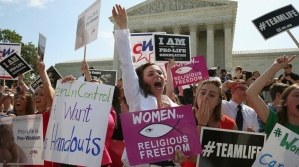
The Supreme Court met today to deliver its ruling on Burwell vs. Hobby Lobby, wherein the Christian family-owned business opposed complying with the Health and Human Services (HHS) mandate of the Affordable Care Act, which requires that employers provide employees with cost-free contraception and abortive measures. ABC News reports that the 5-4 majority ruled in favor of Hobby Lobby this morning, stating that for-profit, family-owned corporations can choose not to offer such measures to their employees if it would violate the owners' religious beliefs.
A precedent has been set today for opposition to the HHS contraception mandate on basis of a business owner's religious beliefs. Hobby Lobby, along with many other Christian-based organizations, was facing legal ramifications because although their business is not a church or religious organization, the owners held Christian beliefs which go against providing abortive drugs and contraception to their employees.
By choosing not to comply with the contraception mandate, Hobby Lobby would have been fined up to $1 million per day had the Court not ruled in its favor. Fox News reports that Hobby Lobby has been waiting for the verdict since oral arguments were given in March.
Those in favor of the HHS mandate claim that allowing businesses to deny such coverage to employees would be discriminating against women whose beliefs differ than those of their employers, and worry that this case might set precedent for a business to oppose any law on the basis of religious beliefs.
The Supreme Court majority ruled that the contraceptive mandate does violate a corporation's right to freedom of religious expression; they also specified that this freedom of expression is meant for corporations which are owned by few individuals, such as family-operated businesses.
"Today's decision is important because the government regulation [which was] struck down punished the Christian entrepreneur," says Hugh Whelchel, executive director for the Institute for Faith, Work & Economics - "The government's assertion that seeking profit is a completely secular pursuit, and that once we go into business, we lose our religious freedoms in the context of those activities, is fundamentally wrong. We are pleased and relieved today that the nation's highest court ruled in a way that upholds the Christian view of work."






